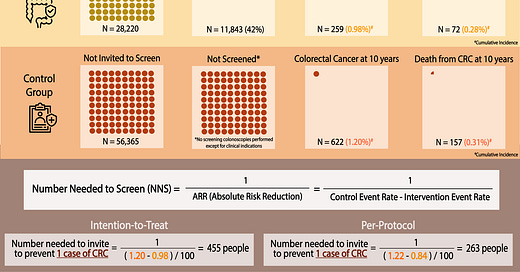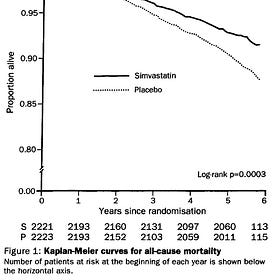Cancer screening is a really hard thing to do well, and it’s even harder to demonstrate the cancer screening truly saves lives.
We’ve all seen PR campaigns on things like mammograms, PSA testing, or lung cancer screening, and I think that the implicit message of these screening advertisements is that they are life saving.
Unfortunately, the actual data is way more complicated than that.
There are some theoretical reasons why cancer screening should save lives:
Likelihood of death from cancer is lower when cancer is localized and less advanced
Screening can often see small tumors or evidence of cancer cells before symptoms develop
Finding small cancers before they’ve spread may make it easier to surgically remove them
But just because something theoretically works, doesn’t mean that it actually works.
You should be aware of confounders like lead time bias and the fact that some cancers caught with screening would never have been life threatening in the first place, but I think it’s also worth being exposed to another theoretical reason why early cancer detection may not always be life saving:
Some tumors have already spread microscopic cells by the time they are detectable under imaging, so by the time you’ve seen them with a screening test, they’ve already spread and are going to kill you anyway.
That’s why it’s not good enough to suggest that screening saves lives, you need to show that it actually does!
Like everything in medicine, if you want to say that something works, you should test whether it works in a randomized trial
That’s where the NordICC trial comes in - this was the first ever randomized trial assessing whether inviting people to undergo colonoscopy for colon cancer screening saves lives overall or saves lives from colon cancer.
Colon cancer is a good type of cancer to study the efficacy of a screening test, because it generally follows a predictable progression: polyp —> localized cancer —> metastatic cancer.
Colonoscopy is a type of screening test that doesn’t just detect colon cancer early on, it actually provides a mechanism to remove the cancer from the body, theoretically preventing that little polyp from ever killing you.
The NordICC trial randomized people to two groups - no invitation to colonoscopy versus being invited to have a colonoscopy for colorectal cancer screening.1
This trial didn’t show much of a difference in likelihood of dying between the groups, or, in other words, it showed that inviting people to undergo a colonoscopy doesn’t seem to save lives:
But there’s more to this story than meets the eye.
How you interpret the data in a trial is really important - you can’t just read the top line conclusion and assume that it’s true
There are a lot of caveats that I would recommend considering before you conclude that a colonoscopy is worthless:
Lots of people didn’t accept the screening, and if you only look at the people who went for the screening, you see that fewer people die of colon cancer in the screened group2
The rate of detecting the polyps that are precursors to colon cancer (called adenoma detection rate, or ADR) was lower in this study than what is considered to be the standard of care in the US
Colon cancer takes a really long time to grow, and this study didn’t follow people for a long enough time to let us draw conclusions about the impact of colonoscopy
And so even though this is the first study looking at this question, I don’t think it’s the last word on the topic.
At the end of the day, we’re left without conclusive evidence, and I think it’s unlikely that we’re going to have more definitive evidence on this topic anytime soon.
For those of us that take care of patients in the real world, we’re often forced to make a decision in the fact of suboptimal evidence.
Ultimately, I land in a pretty simple place with colon cancer screening:
Colon cancer kills a lot of people - over 50,000 annually in the US
The bulk of the evidence suggests that actually screening for colon cancer3 seems to prevent death from colorectal cancer
The type of screening modality is less important than whether or not it’s done - you can do home fecal testing, flexible sigmoidoscopy, or colonoscopy
The benefit of a colonoscopy is that it can both detect and treat early stage colon cancer, and that it looks at the whole colon as opposed to part of the colon (which a flexible sigmoidoscopy does)
The risk of bad complications is low and so the major downside if inconvenience from the prep and procedure itself
I’ve written before that preventive medicine means over-treatment, because most people who are screened or preventively treated don’t ultimately get the disease that we’re trying to prevent:
So I think that colonoscopy remains a good method of preventing colon cancer, and the broader societal questions around policy are for a different group of people to sort out - Is the cost worth it? Who should pay for a colonoscopy? Does the inconvenience of that test make it worthwhile compared to other screening methods?
Listen for more detail on this topic on the podcast below
If you’re interested in this topic, please take a listen to the podcast that I worked on for this trial as part of our Beyond Journal Club Series with NEJM. You can read a transcript of the podcast at the link above and take a look at the show notes there, or you can listen below:
You can’t randomize people to a sham colonoscopy, because you’ll give them a false sense that they don’t have polyps and may make them blow off symptoms that should prompt a real colonoscopy. That’s why it’s a trial assessing the impact of being invited to undergo screening rather than being screened.
There’s potential confounding with this method - maybe there’s something different about people who accept a cancer screening offer versus those who decline it that confounds your results (examples: more health literacy, different socioeconomic status, better baseline health, more trust of the medical system). Once you do this type of analysis (called a per-protocol analysis) you lose the benefit of randomization and open the results up to confounding
As opposed to simply inviting someone to be screened






